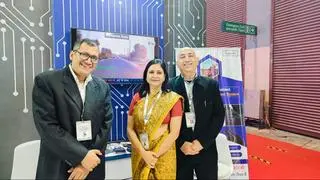Atul Satija had a clear vision in his mind. He wanted to leave his comfy job at Google and embark on a journey to do some social good.
The 39-year-old had one goal: to get on his personal journey before he hit 40. “I was eager to move to the social sector full time. The actual rumblings started while I was in Google, during 2006-10. Whilst there, I enrolled in a programme EndPoverty, a non-profit. Though I joined them as a volunteer, the idea stuck, since poverty alleviation is close to my heart,” said Satija.
Satija, who has an MBA from the Indian School of Business and a BTech from the National Institute of Technology, was Head of Business Development for India at Google and was also leading its mobile business for Japan and Asia-Pacific.
“Google wanted me to relocate either to Japan or to Mountain View, US. It was then that I decided to find something new to do, because I wanted to continue to be in India,” said Satija, realising that his work on various poverty-related issues, including water, sanitation, education, skill development and women empowerment was “heaps more satisfying” than his 9-5 job.
He joined Inmobi, a mobile ad network in India backed by SoftBank. “Though it offered me a much smaller canvas as compared to Google, as Inmobi’s global chief revenue officer, I was responsible for global sales, marketing and business development. The insights I gathered in this role further fuelled my personal ambition, to work full-time to alleviate poverty,” he said.
Satija insists that every human being deserves a dignified life out of poverty, and that collective means can help achieve that goal.
“The intent was there: to do the right thing. That is a latent intent with everyone. But how do you get others involved? How do you become a social nudge, and ensure collectively to give back, to do good to society. How can you nudge an entire system to help pull people out of poverty. These were the questions I asked myself, though push creates a pull, with action and reaction,” said Satija.
Dream comes trueHe started ‘The Nudge Foundation’ in July, to fulfil his passion of working on inequality and social issues. The start-up was bootstrapped by Satija for the initial two years while still at Inmobi, with a “personal investment of around $200,000 that practically wiped out my savings.”
The Nudge Foundation decided on an innovative approach to poverty alleviation. Merely imparting livelihood training was insufficient.
The start-up decided to help build a 360-degree life for the impoverished, ensuring a learning and economic foundation for the poor in residential ‘Gurukuls’, along with a lifelong support system.
“India will continue to add one million to its labour market every month for the next 15 years, most of whom come from impoverished background. This is not gainful. India’s huge workforce has no foundation. It needs deep intervention. The government is looking at Skill India, but unless they have the wherewithal, there is nothing that can be done. Our growing economy with a massive skill deficit is a real opportunity for these people, who can escape the cycle of poverty through gainful employment,” said Satija.
“Our goal is to pull one million people out of poverty by 2020. In the initial period, I was trying to raise ₹4 crore to help me in this endeavour,” said Satija.
Support from NilekaniHis prayers were answered in September when Nandan Nilekani, former CEO of Infosys, announced that he would pledge a seed grant of $200,000 to The Nudge Foundation. Commenting on the grant in a statement, Nilekani said, “The Nudge Foundation is focused on giving underprivileged youth a decent second chance in life, by investing in them in a unique learning environment. We need projects like these to succeed at scale and speed.” The announcement was made at the GMIC Conference, a mobile conference that attracts internet industry leaders, in Bengaluru. Additionally, the Foundation received contributions of $50,000 from GWC (Great Wall Club), $75,000 from InMobi, and $40,000 from Paytm at the event’s fundraiser.
The Foundation has received support from other entrepreneurs, as its Board and Advisory members include Arun Seth, ex-Chairman, British Telecom & Alcatel-Lucent, who is passionate about community service; Hugo Barra, Vice-President, Xiaomi; Naveen Tewari, Founder & CEO, InMobi; and, Vijay Shekhar Sharma, Founder, Paytm & One97.
This August 15, the Foundation organised FreedomHack'15: India’s first Hackathon for a social cause.
Though the concept was similar to most hackathons, FreedomHack’15 brought together programmers and software engineers to create practical solutions towards the challenges being faced by non-profit organisations.
Hackathon for a social cause“I have personally visited 45 slums in Bengaluru and Delhi to get a feel of things. There is a lot of reliance on volunteers to do things, but there are many pros and cons. The FreedomHack helped raise many issues, as well as money,” said Satija.
The event aroused much interest. Satija said people at travel portal “Makemytrip came over to ask how they could help. Many asked about crowd funding, about a micro finance platform. The event also provided an opportunity to IT engineers to contribute to non-profit.”
The Foundation has inked a partnership with Godrej Saloni, a CSR initiative of Godrej Consumer Products, to focus on imparting life skills and beautician training at Gurukuls.








Comments
Comments have to be in English, and in full sentences. They cannot be abusive or personal. Please abide by our community guidelines for posting your comments.
We have migrated to a new commenting platform. If you are already a registered user of TheHindu Businessline and logged in, you may continue to engage with our articles. If you do not have an account please register and login to post comments. Users can access their older comments by logging into their accounts on Vuukle.